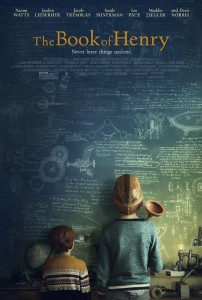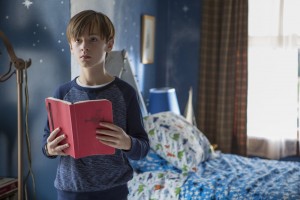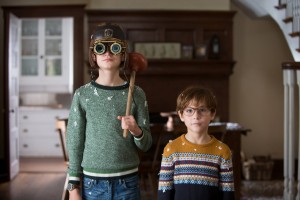 Films are divided into three acts. The first is typically called the Setup, in which we meet our protagonist, antagonist, and supporting characters, and learn a bit about who they are and what they want. The first act ends with a turning point in which our hero(es) are set on a road toward adventure and self-discovery, with a task that must be accomplished, and a confrontation with the antagonist awaiting them. The second act is when things become dark and dramatic, in which our characters face seemingly impossible odds. There’s often conflict within themselves, and with one another, before reaching a point of no return that leads into the third and final act in which all things are resolved. The simplest way to illustrate this is to take the original “Star Wars” trilogy (i.e., the good ones) and treat them as one long film divided into three acts; the adventures of Luke Skywalker demonstrate storytelling structure in a way as simple and effective as to be obvious to children and adults alike.
Films are divided into three acts. The first is typically called the Setup, in which we meet our protagonist, antagonist, and supporting characters, and learn a bit about who they are and what they want. The first act ends with a turning point in which our hero(es) are set on a road toward adventure and self-discovery, with a task that must be accomplished, and a confrontation with the antagonist awaiting them. The second act is when things become dark and dramatic, in which our characters face seemingly impossible odds. There’s often conflict within themselves, and with one another, before reaching a point of no return that leads into the third and final act in which all things are resolved. The simplest way to illustrate this is to take the original “Star Wars” trilogy (i.e., the good ones) and treat them as one long film divided into three acts; the adventures of Luke Skywalker demonstrate storytelling structure in a way as simple and effective as to be obvious to children and adults alike.
Coincidentally, the gentleman slated to direct the as-of-yet untitled ninth episode of the “Star Wars” sequel trilogy is Colin Trevorrow, who has to his credit a bland and soulless reboot (“Jurassic World”), an indie so obnoxious as to be almost offensive (“Safety Not Guaranteed”), and now this latest film, “The Book of Henry.” The “Star Wars” connection aside, Trevorrow’s “The Book of Henry” is remarkable (and groundbreaking?) in its use of three-act structure, in that each act is so bizarrely different from the one that proceeds it as to render the final product nigh incomprehensible in its schizophrenia. It’s like the beginning, middle, and end of three completely different movies from three completely different genres have been jammed together, each one featuring the same characters but with three entirely different audiences in mind.
Let’s walk through this, shall we?
ACT I: “The Child Prodigy With The Emotionally Stunted Parent/Guardian Movie”
We meet our characters. Here’s Henry (Jayden Lieberher), one of those punchably precocious children who only exists in over-earnest indies. He plays the stock market from a pay phone outside his elementary school; he invests his earnings of nearly three-quarters of a million dollars while hunched over a MacBook Pro as flightly artist/waitress mom Susan (Naomi Watts) is glued to the PS4 shooting computer-generated monsters in that “too into it” way non-gamers think looks realistic. See, while Henry takes care of her, she doesn’t actually need that dead-end waitressing job she shares with her heart-of-gold-alcoholic friend (Sarah Silverman), because Henry’s got both Mom and his little brother Peter (Jacob Tremblay) covered. Look, isn’t it funny how Peter asks his mommy questions about Grown-Up Stuff, and whatever she responds, Henry corrects her? And how Henry stands up to his teachers, principal, and other adults in that “adult voice” that’s so Ha Ha in movies like this, but would be considered borderline personality disorder (and very, very punishable) in real life? It’s all so Indie Hip Cute, with the family singing Stevie Nicks songs on the ukele and building elaborate Rube Goldberg machines and blowing fake snow into the house to act out comedic skiing gags…until Henry begins a campaign to save his pre-teen neighbor Christina (Maddie Ziegler) from the sexual advances of her stepfather (Dean Norris), who just happens to be the police commissioner! Whoa, this is getting dark all of the sudden! That must mean we’re sliding into…
Okay, forget that subplot about sexual abuse, because the movie does, too. Trust me: when it comes back around, you’ll wish it hadn’t. Right now it’s time for Henry to come down with Sudden Movie Inoperable Brain Tumor Syndrome. This gives everyone the opportunity to dry-cry for the camera. Watts is good with this stuff, so we can guarantee tears, a red nose, and even some snot; Sarah Silverman and the kids avoid the messy stuff and just hitch and convulse to varying degrees. Even the kid from “Room” snuffles a whole lot of nothing. Then Lee Pace shows up playing Henry’s doctor, and his chief character trait is to have a beard. We suspect that he and Susan may end up dating, but we’ll deal with all that later. Right now, the focus is on Henry’s rapid decline and sudden death, all of which is shot in such a way as to make vivid use of light and shadow while still making it kind of unclear whether or not the kid’s really dead, or just in a really long coma. There’s no funeral, so maybe oh wait never mind, he’s really dead. Oh yeah, SPOILER ALERT, by the way. So anyway, he’s dead now, but not only that, he left a journal for his mother to read – that’s right, the literal “Book of Henry” – and a…cassette tape? Well, that tape can’t be too important, since this isn’t called “The Tape of Henry,” so…no, never mind, she’s listening to it. In fact, she doesn’t stop listening to it for the rest of the movie. The book pretty gets forgotten from here on out. I guess maybe that’s because it gives us the opportunity to have these “cute” Movie Moments where someone responds to something a person says in a recording, only to have the recording respond to the response? Hey, look, even from beyond the grave they have a connection! That’s so precious. They’re growing closer in death than they were in life, as Watts accepts responsibility and the responsibilities of motherhood via a conversation from beyond the grave. In this case, the ongoing dialogue — which is adorable, by the way — involves Henry walking Susan through the process of healing through the act of BUYING A GUN AND PLANNING THE ASSASSINATION OF THEIR NEIGHBOR. Here comes the third act!
 ACT III: “The Hitchcokian Thriller”
ACT III: “The Hitchcokian Thriller”
If you’re one of those teeming multitudes whose dreamt of a film in which Naomi Watts set up a sniper rifle and take aim at a defenseless man (okay, a vicious sex offender, but still), intercut with an elementary school talent show featuring a ginger kid rapping with a lisp, then buckle the hell up. And this isn’t just any talent show: it’s a talent show in which all the performances have special significance or symbolism designed to heighten the intensity of the “Manchurian Candidate”-style plotline interwoven throughout. Trevorrow has massive creative biceps to have raised so mighty a cinematic Colossus. To the point, by this time, the disembodied voice of the dead kid, instructing his mother on how to best execute the police commissioner and then cover her tracks, has lost its sentimental quality and taken on a disturbing, horror movie quality that’s insane the moment you stop to think about it. For all we know, it’s not Henry but Captain Howdy, ready to tell Susan where to hide the crucifix. Then stuff happens, fake snow, lots of equally fake crying, and denoument. They all live happily ever after (except for Henry, who’s still dead, but hasn’t had to be in the movie since the first hour, so: yay?).
Given Trevorrow’s understanding of act structure, and his unique subversion of its perceived limitations (i.e, adhering to one monotonous genre for the length of an entire film), “The Book of Henry” is an example of avant-garde, quasi-experimental filmmaking. Even the manner in which he names the film after one media (a book) and then substitutes another (a recording) demonstrates his willingness and desire to challenge our expectations and elevate the art form to heights previously undiscovered. Or maybe it’s just a really shit movie.
Directed by Colin Trevorrow
Written by Gregg Hurwitz
Rated PG-13 for thematic elements and brief strong language




Leave a Reply
You must be logged in to post a comment.